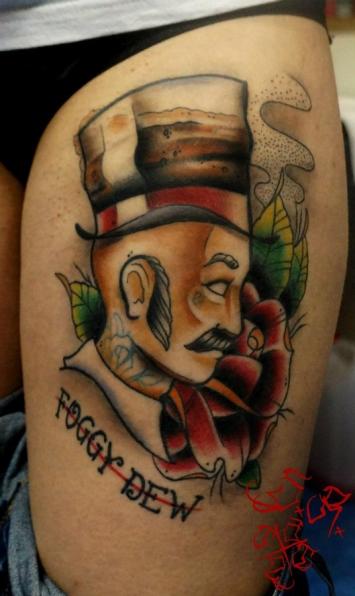МУЗЫКА / СИНГЛЫ
Foggy Dew (ирландская баллада)

«Foggy dew» (рус. «Туманная роса») — общее название нескольких ирландских баллад-плачей. Наиболее известные из них описаны в этой статье.
Ирландский плач
Текст плача был опубликован во втором издании сборника песен «The Home and Community Songbook», изданного в 1931 г.
Sheet music: http://easypiano.cz/sheetmusic/139/foggy-dew-irish-ballad.Все видео
Oh, a wan cloud was drawn o’er the dim weeping dawn
As to Shannon’s side I return’d at last,
And the heart in my breast for the girl I lov’d best
Was beating, ah, beating, how loud and fast!
While the doubts and the fears of the long aching years
Seem’d mingling their voices with the moaning flood:
Till full in my path, like a wild water wraith,
My true love’s shadow lamenting stood.
But the sudden sun kiss’d the cold, cruel mist
Into dancing show’rs of diamond dew,
And the dark flowing stream laugh’d back to his beam,
And the lark soared aloft in the blue;
While no phantom of night but a form of delight
Ran with arms outspread to her darling boy,
And the girl I love best on my wild throbbing breast
Hid her thousand treasures with cry of joy.
Версия этой баллады с измененным Л. Ф. Миллиганом текстом была записана тенором Дж. МакКормаком под аккомпанемент пианиста Сенсера Клэя для фирмы «RCA Victor Records» 3 января 1913 г. на их студии в Кэмдене, Нью-Джерси.
Пасхальное восстание
Другой вариант баллады, также получивший название «Foggy Dew», был написан Кэноном Чарльзом О’Нилом — приходским священником из местечка Килку, (графство Даун,Северная Ирландия), позднее служившим в Ньюкастле (графство Даун,Северная Ирландия) в 1919 г. Эта песня описывает Пасхальное восстание 1916 г. и призывает ирландцев бороться за свободу Ирландии, а не за интересы Великобритании на полях сражений Первой мировой войны (по данным профессора Университета Ольстера К. Джеффери за Британскую империю во время войны сражались в общей сложности 210 000 ирландцев.)
Текст песни
As down the glen one Easter morn to a city fair rode I
There Armed lines of marching men in squadrons passed me by
No pipe did hum, no battle drum did sound its dread tattoo
But the Angelus Bell o’er the Liffey's swell rang out through the foggy dew
Right proudly high over Dublin Town they hung out the flag of war
'Twas better to die 'neath an Irish sky than at Suvla or Sud-El-Bar
And from the plains of Royal Meath strong men came hurrying through
While Britannia’s Huns, with their long range guns sailed in through the foggy dew
Oh the night fell black, and the rifles' crack made perfidious Albion reel
In the leaden rain, seven tongues of flame did shine o’er the lines of steel
By each shining blade a prayer was said, that to Ireland her sons be true
But when morning broke, still the war flag shook out its folds in the foggy dew
'Twas England bade our wild geese go, that «small nations might be free»;
Their lonely graves are by Suvla's waves or the fringe of the great North Sea.
Oh, had they died by Pearse’s side or fought with Cathal Brugha
Their graves we’d keep where the Fenians sleep, 'neath the shroud of the foggy dew.
Oh the bravest fell, and the Requiem bell rang mournfully and clear
For those who died that Eastertide in the spring time of the year
And the world did gaze, in deep amaze, at those fearless men, but few,
Who bore the fight that freedom’s light might shine through the foggy dew
As back through the glen I rode again and my heart with grief was sore
For I parted then with valiant men whom I never shall see more
But to and fro in my dreams I go and I kneel and pray for you,
For slavery fled, O glorious dead, when you fell in the foggy dew.





